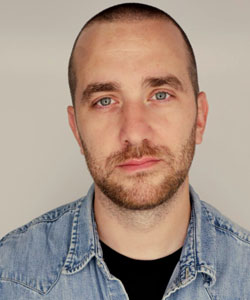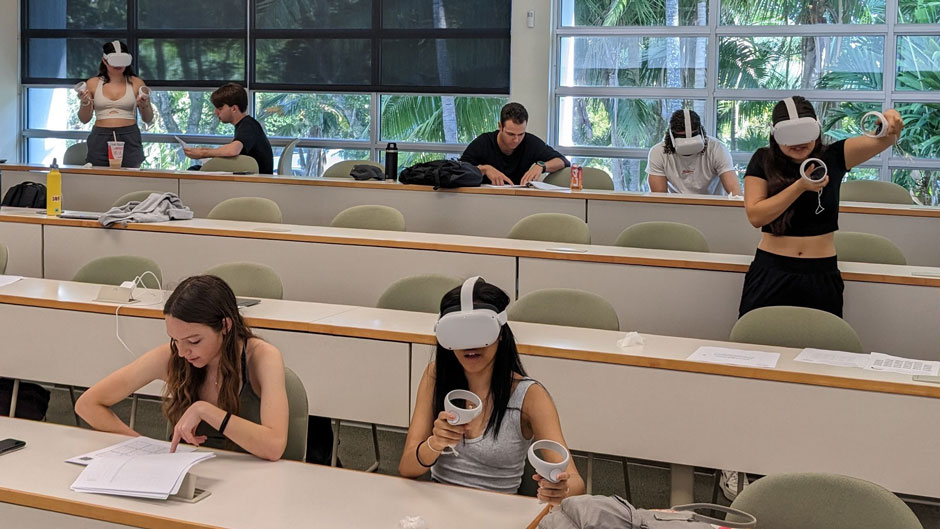Before they dive into discussions on homelessness, students in Matthew Watts’ philosophy classes spend time in the shoes of a person who is living out of their car. They also interact with a woman in a homeless encampment.
These experiences, which are made possible thanks to virtual reality, provide students with insights into issues like homelessness and incarceration with which they often have little personal experience.
“I use virtual reality to get the students to open up or connect to a topic that they find really difficult,” explained Watts, a graduate student who is completing his Ph.D. in philosophy at the University of Miami College of Arts and Sciences.
Watts has found that the technology can be used to help students empathize with people who have different life experiences, leading to more nuanced discussions. “That empathy allows them to think about these topics in new and different ways,” he said.
Watts’ use of virtual reality in the classroom was inspired by his service-learning experiences during his undergraduate studies at Portland State University. When Watts started planning his own courses, he remembered how meaningful he found these volunteer opportunities.
“I didn’t want to just teach classes and point at philosophical concepts and say, ‘memorize that,’” Watts said. “I wanted to make a lasting impression on the students.”

He found that service-learning was difficult to integrate into some philosophy classes, however, because the available volunteer opportunities didn’t fit with the subject matter in, say, a course on the philosophy of the mind. Then Watts’ son invited him to play a virtual reality game, and Watts was impressed by how realistic the experience felt. He saw the potential for using virtual reality to not only help his students connect with the subject matter, but also “walk a mile in the shoes of someone else.”
The Department of Philosophy, which already had a few virtual reality headsets from a previously offered course, supported Watts’ plan to use the technology in his classes and ordered more headsets.
Now, virtual reality is a key component of several of Watts’ classes. In his Immersive Experience and Virtual Reality class, students participate in virtual reality experiences, like the ones focused on homelessness, as well as other immersive activities, including escape rooms and float tanks. Watts also uses virtual reality in his Social and Ethical Issues in Computing class. Both courses explore how technology is changing the way we understand the world.
Watts has found that virtual reality can also help students grasp difficult concepts in classes on other philosophical issues. When he teaches about phenomenology, which involves the study of structures of consciousness, for example, Watts invites students to participate in a virtual reality experience in which they walk along a plank suspended from the 80th story of a building.
“A lot of students will start to sweat, and some of them refuse to walk out onto the plank,” Watts said. “It gives them a real-world experience of this philosophical issue we’re discussing.”
Watts’ work incorporating virtual reality was recognized by the American Philosophical Association earlier this year when Watts received honorable mention for the Oxford University Press Teaching with Technology prize. The award recognizes early-career philosophers for the exceptional use of technology in teaching philosophy.
“Modern philosophy was born in virtual reality—in the form of a series of thought experiments devised by René Descartes. A thought experiment is way of making an abstract idea graphic, and therefore making it concrete,” said Mark Rowlands, the chair of the Department of Philosophy. “Matthew is carrying on a venerable tradition of thought but doing so using a cutting-edge technology that extends its possibilities in a way Descartes could scarcely have imagined. We are all very happy for Matthew and delighted that his ground-breaking approach to teaching has been duly recognized by the American Philosophical Association.”

